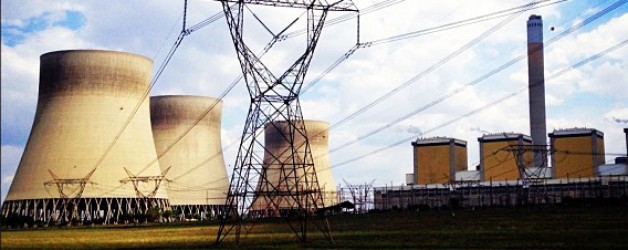The Kendal coal-fired power station in Mpumalanga, South Africa. Original image by Darren Smith
New coal plants deepen South Africa’s climate debt for the benefit of transnationals, while leaving South Africa’s poor in the dark.
Location: South Africa
Status: Active
This $3.75 billion World Bank loan to Eskom is financing one of the dirtiest coal-fired power plants in the world. The majority of the funds – over $3 billion – is going towards the construction of the 4,800 MW Medupi power plant, which is set to be the world’s fourth largest coal-fired power plant. Medupi will add an estimated 25 million metric tons of CO2 emissions per year to Eskom’s 40 percent share of South Africa’s overall total greenhouse gas emissions.
The project is part of a $50 billion expansion plan by Eskom to increase generation capacity in South Africa. The country – one of the most energy-intensive economies of the world – has been facing an electricity crisis since early 2008 due to demands for power exceeding supply.
The World Bank claims the project will alleviate poverty and increase electricity access to the poor when, in reality, the project largely benefits major industries that consume electricity below cost, while the poor bear a disproportionate responsibility for sharing the costs of the project. At the same time, negative impacts on local communities located near the mines where the coal will be sourced and the plant itself, which is already under construction, are expected to be severe.
The World Bank loan fails to meet its own goals of poverty alleviation and mitigation of the harmful effects of global warming. Little transparency exists of the assumptions underpinning plans for how to meet energy needs in South Africa. Neither the World Bank nor Eskom adequately evaluated clean energy alternatives, including demand side management, especially in regards to the “special pricing agreements” for industrial users.
The project is designed to mainly supply multinational mining and metals corporations who benefit from apartheid-era contracts that provide them with the cheapest electricity supply in the world, while the poor are left to deal with higher costs for electricity. To finance its massive capital intensive expansion plan, the National Energy Regulator of South Africa allowed Eskom to increase electricity tariffs 25 percent per year between 2010 and 2013.
Eskom’s unjust electricity rate hikes present serious problems to affordable electricity access for the poor. Currently, the poor consume less than 5 percent of the electricity grid, in contrast to the 38 largest corporations in the country who consume 40 percent. The poor are being forced to pay far more for electricity than export-oriented metals and mining corporations who export the bulk of their profits outside of South Africa, leaving the country with the world’s highest balance of payments deficits.
Not only will low-income, predominantly black South Africans pay through their pocketbooks, poor people will also have compromised health, and land, air and water quality because of this plant. Significant outstanding concerns include the potential health impacts on communities living in the vicinity of the Medupi plant, particularly the risk of exposure to the now serious problem of mercury residues in the air, water and land caused by coal-fired electricity generation. At the same time, the project poses problems for communities who live near the mining sites where the coal will be sourced, which is an acute problem in a country whose water table and air are already being polluted by the coal industry. In addition, Eskom’s wasteful consumption of water for cooling is putting an additional burden on drought-prone South Africa’s long-term water scarcity challenge.
Civil society groups from South Africa, Africa and around the world are calling for the transformation of South Africa’s electricity generation, consumption and financing. The South African government cannot continue to give away electricity to corporations which have little linkage to the South African economy while poor citizens are disconnected from electricity access due to high costs. It is critical that demand side management occurs and that transparent contract renegotiations begin for the dubious special purchase agreements which have allowed large corporations to practically steal electricity.
Official Documents
- World Bank Eskom Project Page (World Bank website)
- Inspection Panel Investigation Report, Management Report and Recommendations, Management Supervision and Monitoring Supplemental Note (World Bank website)
- Eskom Power Investment Support Project Fact Sheet (World Bank , 2012)
- Questions & Answers on Eskom Project (World Bank , 2010)
- Expert Panel Recommendations on Eskom Loan (World Bank, 2010)
Civil Society Analysis
- Civil Society Statement on World Bank Eskom Loan, February 16, 2010
- The World Bank and Eskom: Banking on Climate Destruction by David Hallowes, groundWork, December 10, 2009
- The World Bank Eskom Support Project by Smita Nakhooda, World Resources Institute, March 8, 2010
Press
- World Bank confirms investigation into Eskom loan Mmusi Maimane, October 2015 (Politics Web)
- Medupi Timeline: Costs, delays spiralling – no completion in sight Stuart Lowman, August 2015 (BizNews)
- World Bank’s Environmental Injustice in South Africa Nezir Sinani, August 2014 (Huffington Post)
- World Bank To Review Delay Of Pollution Controls At South African Coal Plant Kate Sheppard November, 2013 (Huffington Post)
- South Africa Wins $3.75 Billion Coal Loan April 9, 2010 (New York Times)
- World Bank Fuelling Dirty Energy March 17, 2010, (World Development Movement website)
- South Africa Says US to Abstain From World Bank Power Loan Vote March 12, 2010 (Reuters website)
- World Bank Gives South Africa Lumps of Coal by Lori Pottington, March 9, 2010 (Huffington Post website)
- Africa Ready for Energy Transformation: World Bank by Lesley Wroughton, March 4, 2010 (Reuters website)
- ‘Scrap Eskom’s Plan to Steal’ by Noelene Barbeau, February 17, 2010 (IOL website)
Bobby Peek,groundWork
bobby@groundwork.org.za
www.groundwork.org.za
Tristen Taylor, Earthlife Africa
tristen@earthlife.org.za
www.earthlife.org.za

